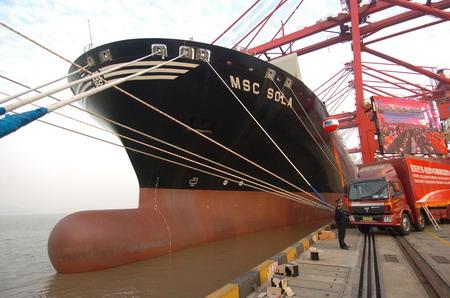
Ningbo Port Co plans to raise up to 13.3 billion yuan ($1.95 billion) in its initial public offering (IPO) in Shanghai. The company is scheduled to sell 2.5 billion shares in Shanghai sale and up to 2.35 billion shares in Hong Kong. [Zhang Peijiam / China Daily]
Sector outlook still promising given growing cargo demandSHANGHAI - The China Securities Regulatory Commission (CSRC) will review the application for an initial share sale by Ningbo Port Co on Friday. Analysts said the company's plan to go public during a bearish market period will lead to a low valuation price.
Ningbo Port Co plans to raise up to 13.3 billion yuan ($1.95 billion) in its initial public offering (IPO) in Shanghai, according to a statement posted on the CSRC website. The company is scheduled to sell 2.5 billion shares in its Shanghai IPO, and to further sell up to 2.35 billion shares in Hong Kong, said the statement.
As a leading port in China, Ningbo Port has all the makings of a listed company, and the final approval from the regulator is just a matter of time, said Zhang Hongbo, an industrial analyst with Citic China Securities.
According to Zhang, Ningbo Port started preparatory work on the IPO several years back. During the sidelines of the annual National People's Congress in March, Li Linghong, board chairman of the company, told China Daily that Ningbo Port will look to list its shares by the end of the second quarter at the latest.
The recent slide in the capital market dealt a blow to most of the listed ports. Shanghai International Port (Group) Co Ltd (SIPG), the nation's largest port operator, tumbled 20.1 percent since April 16, even as the Shanghai Composite Index shed 17.95 percent. Shenzhen Yantian Port Holdings Co Ltd also dropped 21.1 percent since the middle of April.
From January to April, major domestic ports' cargo throughput totaled 2.48 billion tons, up 20.2 percent year-on-year, while the container throughput reached 43.68 million twenty-foot equivalent units (TEU), up 22.4 percent over the same period of 2009.
"The shipping industry walked out of the recession shadow in 2009, and has since then been showing a steady growth," said Yu Jianjun, an analyst with Huatai Securities.
Like its major competitors in the Yangtze River Delta, Ningbo Port also experienced a bumpy road in business performance, but the outlook is still promising given China's burgeoning shipping demand.
Ningbo Port's business mainly comes from companies based in Zhejiang, Jiangxi, and south of Anhui province. While SIPG's shipping customers are from Shanghai, Jiangsu, Anhui and along the Yangtze River.
"Though there is client overlap in regions like north of Jiangxi province, south of Jiangsu province and north of Zhejiang province, the two ports would prefer to avoid a direct rivalry and rather forge some kind of cooperation," he said.
The two ports also differ in their respective positioning. Ningbo Port aims to be an important regional shipping center, while SIPG plans to be a global shipping hub.
For the moment, both the two ports are strictly following their plans by charting IPOs and venturing overseas. Last Friday, SIPG inked its first overseas deal by buying a 25 percent stake purchase in the Zeebrugge container terminal in Belgium for 27.16 million euros ($32.96 million).





